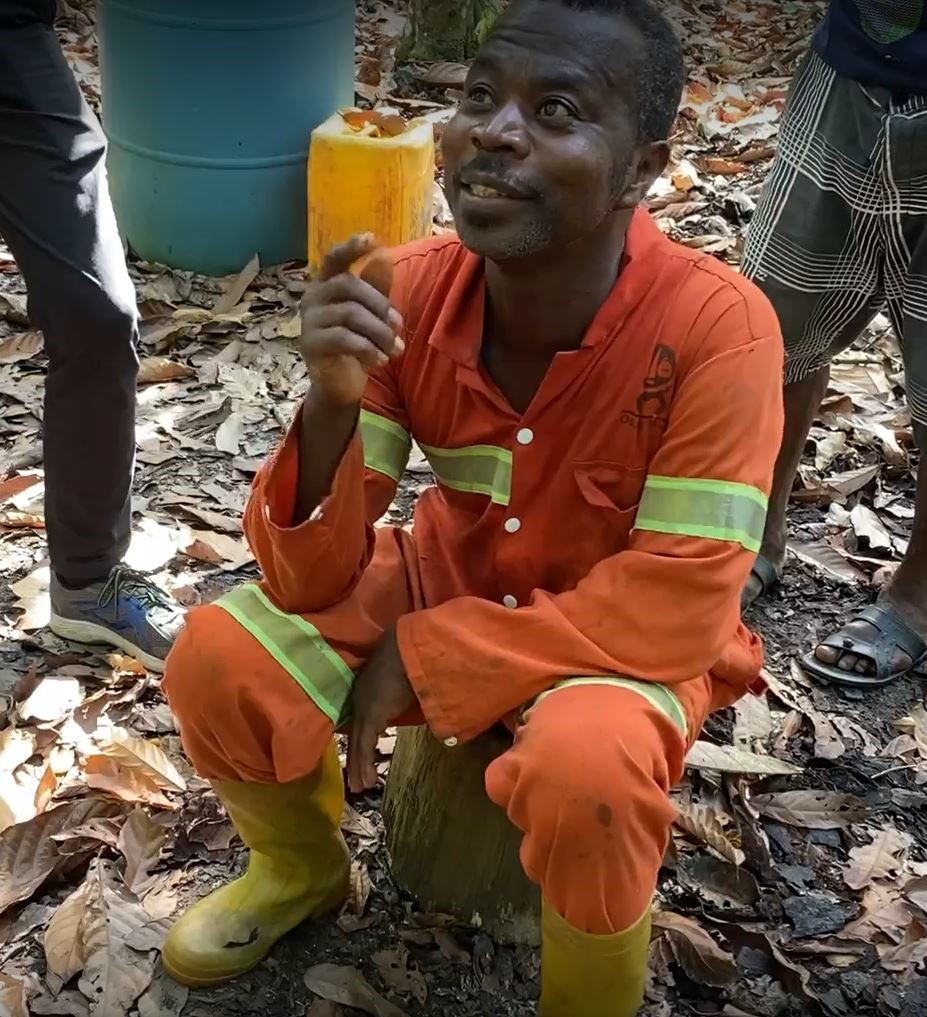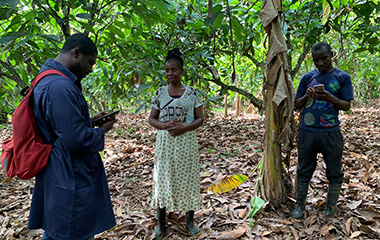Cocoaching: Individualised Coaching for Sustainable Cocoa Farming at Scale
"Next year, everything will be implemented!" cocoa farmer Paul Nkyi tells an ETG Field Officer during a field visit.
Paul is a 55-year-old cocoa farmer, and father of six children. In 2020-21 he had 15 bags of cocoa from his farm, and he expects this to increase this year thanks to the individual coaching that he has been receiving through the ETG Cocoaching programme.
Cocoaching is an individualised training programme launched by ETG Sustainability Foundation Beyond Beans in 2021 to support smallholder cocoa farmers in achieving higher yields through more environmentally beneficial practices. Paul has received farm-specific advice from our Cocoaching Field Officers which he has already begun to implement. He has learned that in the parts of his farm where the sunlight is showing, he can plant some cocoa trees, and he has been taught to manage the soil and to remove black pods when he sees them. All of these practices, specific to his farm, will help Paul increase his yields.
Why is Individual Coaching Important?
Farmer Field Schools (FFS) have been the main source of trainings conducted for smallholder farmers over the past decade. However, low GAP (Good Agricultural Practices) adoption rates and a growing need for increasing farmers’ climate resilience demonstrate the need for a way of providing support that is more farmer specific. While FFS can cause farmers to become frustrated by generalised advice, we have seen that personalised advice leads to higher farmer motivation. This means more farmers adopt good agricultural, social, and environmental practices on their farms, which ultimately increases impact.
We have also seen that individual coaching can create broader community impact. Farmers who are coached with farm-specific information tend to see an increase in their knowledge and motivation, and are more likely to share their learnings with their community.
As Ghana and Ivory Coast’s governments further develop national sustainability standards, individual development plans may soon become obligatory for all farmers.
How does Cocoaching work?
With Cocoaching, we provide farmers with concrete advice that matches their farm’s needs and their personal situation. The programme is based on Grameen Foundation and Rainforest Alliance’s FarmGrow application, which we started using in 2019. Seeing the progress it brought for the sector, we have attempted to further improve the tool and to create an efficient, holistic, and cost-effective version that can be upscaled across our supply chains.
Field Officers visit each of their farmers twice per year. These visits include a farm inspection, followed by an individual farm development plan coaching session. Both visits are done by the same Field Officer, to create consistency for the farmers we work with. This allows our Field Officers to build meaningful relationships with farmers and their families.
During the initial visit, Field Officers fill out a questionnaire with the farmers, assessing the current farm and farmer capacity in three categories: socio-economic situation, farmer motivation, and adoption observations from the farm. Field Officers calculate a score for farmers in each of these categories using a digital application, and then fill out a Farm Development Plan document which becomes farmers’ annual plan with concrete tips to sustainably increase yields. Later in the year, a follow-up coaching session helps farmers assess progress and define next steps, with the possibility to adjust targets if necessary. “Next year when the Field Officer comes, everything will be implemented, and I hope there will be a lot of pods,” says Paul Nkyi.
For more information on the Cocoaching Methodology, read our Notes from The Field Report: Cocoaching_General_.pdf




